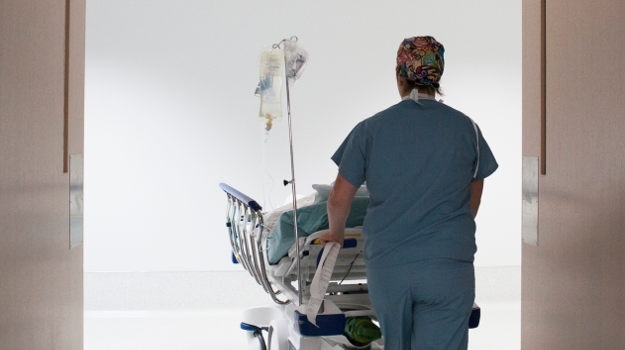


A nurse pushes a patient into surgery (Getty)
- Doctors warn that many private practices may be forced to close down, which will impact patients’ access to care during the pandemic and afterwards.
- This is as patients opt not to visit doctors for non-emergency care during the outbreak. Ophthalmologists have been the hardest hit, with a 90% decline in patient numbers.
- Doctors have proposed a payment plan to medical aids, which they say is not a bailout.
Doctors’ groups say their plea for financial assistance from medical aids will not require them to tap into their reserves, as patients opt to not visit doctors for non-emergency visits during the pandemic.
Since the lockdown started in late March private practitioners, particularly specialists like Ear, Nose and Throat doctors, have seen their patient numbers fall by up to 60%.
Ophthalmologists have been the hardest hit, with a 90% decline in patient numbers, according to the doctors’ groups.
As a result, the groups say many doctors may be forced to close down their practices, an issue that will also impact patients’ access to care during the pandemic and afterwards.
To find a solution and help practitioners survive the pandemic, a doctor grouping – made up of the Progressive Health Forum, the South African Private Practitioners Forum, the South African Medical and Dental Practitioners and the South African Medical Research Council – approached medical aids and banks with a proposal.
The doctors are not making money now because medical aids are not paying them, since patients are not visiting doctors and are not claiming from the medical aids. Without the patients, the doctors can’t make money, but the arrangement guarantees that every month they will get the same amount of money they made last year at the same time.
‘Misconception’
Dr Aslam Dasoo from the Progressive Health Forum said there has been a misconception that the proposal is suggesting that medical aids use their reserves to assist the practitioners.
The Medical Schemes Act requires that medical aids keep their reserves at 25% of annual gross contributions.
On Wednesday, Dasoo said the proposal will only require medical aids to use the funds that are currently not being used by members, to help the practitioners stay afloat during the Covid-19 pandemic.
The group sent the proposal to medical schemes, the Council for Medical Schemes (CMS) and major medical aids, which he said are still studying the proposal.
Banks are helping the doctors access funds allocated by the government.
A switch in timing of payments
“What we are proposing is a switch in the timing of the payments [the schemes would have otherwise made] because of the current situation in practices and the low demand,” said Dasoo.
He emphasised that the payments will not be a bailout.
“Given that it is a two-year process, eventually those patients who would have come to the doctors, who are not coming now, will come.
“And because of the cap, the doctors will be seeing these patients and the scheme funding that was pre-funded to the doctors will be properly utilised,” Dasoo said.
He added that because the pre-funding will be capped at 2019 fees, schemes would benefit since the fees will not include the annual 10% increase.
The CMS said it had been approached by various organisations with proposals to assist doctors.
But the council said the proposals had failed to demonstrate the societal benefit for medical scheme members.
However, the practitioners’ groups say doctors having to shut down because they to operate their practices, is a societal issue.
“Societal benefit is a term that should be used carefully, if practices close, society does not benefit,” Dasoo said.
His sentiment was echoed by the South African Medical and Dental Practioners’ Dr Nkateko Munisi and Dr Glenda Gray from the South African Medical Research Council, who emphasised that practitioners need to be able to continue delivering care for patients who have Covid-19 and those who don’t.

